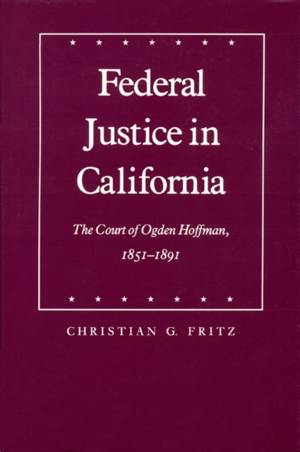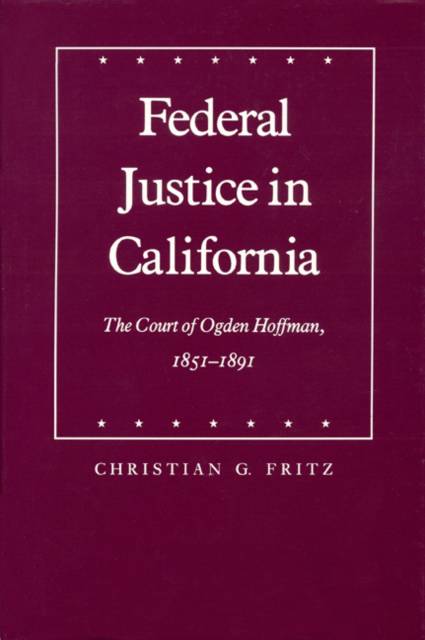
- Afhalen na 1 uur in een winkel met voorraad
- Gratis thuislevering in België vanaf € 30
- Ruim aanbod met 7 miljoen producten
- Afhalen na 1 uur in een winkel met voorraad
- Gratis thuislevering in België vanaf € 30
- Ruim aanbod met 7 miljoen producten
Zoeken
Federal Justice in California
The Court of Ogden Hoffman, 1851-1891
Christian G Fritz
Hardcover | Engels
€ 91,95
+ 183 punten
Omschrijving
For forty years Ogden Hoffman presided over the federal district court for the Northern District of California, disposing of more than nineteen thousand cases brought before him. Federal Justice in California: The Court of Ogden Hoffman, 1851-1891 considers a career remarkable for longevity and productivity and at the same time examines the operation of a federal trial court in nineteenth-century America - the cases adjudicated, their significance, and the court's impact upon the community. Solidly researched, Christian G. Fritz's book is unique in attending to the law on the level at which it was most often encountered by participants in legal actions. During his four decades on the bench, from the time of the California gold rush to the anti-Chinese movement of the 1880s, Hoffman dealt one-on-one with a cross-section of humanity: through his court came sea captains, seamen seeking their wages, wealthy steamship owners and distraught and injured passengers, and Chinese immigrants. Fritz shows him adjudicating land grant conflicts and bankruptcy cases and presiding over the admiralty, criminal, and common law and equity dockets. The author has examined thousands of Hoffman's cases to gain insight into how nineteenth-century federal trial courts were used, by whom, and with what effect. The successful use that a broad range of plaintiffs made of Hoffman's court requires a re-examination of theories suggesting that law of the period primarily developed and courts largely operated in ways that promoted commercial and entrepreneurial interest. Just as important, Fritz's sensitive analysis of an institution never loses sight of the proud life-long bachelor, native New Yorker, and scion of a distinguished family who always identified himself with his court. Christian G. Fritz is a professor of law at the University of New Mexico.
Specificaties
Betrokkenen
- Auteur(s):
- Uitgeverij:
Inhoud
- Aantal bladzijden:
- 324
- Taal:
- Engels
Eigenschappen
- Productcode (EAN):
- 9780803219793
- Verschijningsdatum:
- 1/03/1991
- Uitvoering:
- Hardcover
- Formaat:
- Genaaid
- Afmetingen:
- 160 mm x 237 mm
- Gewicht:
- 703 g

Alleen bij Standaard Boekhandel
+ 183 punten op je klantenkaart van Standaard Boekhandel
Beoordelingen
We publiceren alleen reviews die voldoen aan de voorwaarden voor reviews. Bekijk onze voorwaarden voor reviews.











